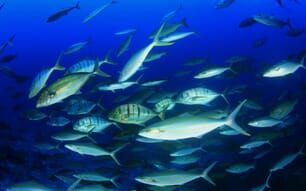Meetings with Welsh fishermen will take place during the period 18-20 March, at venues in Bangor, Aberystwyth and Carmarthen.
Reformed CFP requirements
In June 2013 EU member states signalled agreement to an historic deal to reform the CFP. The package of reforms includes firm dates to ban fish discards, through "landing obligations" for all quota stocks.
These will be phased in, fishery by fishery, starting with pelagic fisheries on 1 January 2015 and running until January 2019.
The measure with perhaps the greatest impact on the fishing industry is the move to catch quotas. Once the landing obligations are in place fishermen will be required to land the total catch of quota species, irrespective of fish length. This means that future quotas will be related to what is caught rather than what is landed.
Furthermore, once a vessel's catch quota for any quota species has been reached, then they may need to cease fishing altogether and must seek advice from fisheries managers before they can resume fishing.
Preparing the way ahead
All fishermen who catch quota species will be affected by these requirements. To help them to prepare for these changes, Defra and Cefas have begun a five-year project, "Applied Science to Support the Industry in delivering an end to discards" (the ASSIST project).
In England, the first stage of the ASSIST project was to reach a common understanding of the greatest potential impacts of the reformed CFP. This was done by looking at catch data gathered by Cefas observers whilst on commercial vessels and on the quayside, and listening to industry opinions on the scale and patterns of discarding in each fishery during the autumn 2013 English meetings.
In the second stage, a number of trial projects are testing further improvements in gear selectivity and determining the potential survivability of certain fish species. Survival could mean exemption from the Discards Ban, if sufficient scientific evidence is obtained.
ASSIST in Wales
Now, in Wales, a similar approach is being progressed as part of a collaborative programme of research between Cefas and the Welsh Government.
To kick off the ASSIST project there, Cefas fisheries scientists Robert Forster and Tom Catchpole will visit Welsh ports to meet fishermen and help identify the potential impacts and opportunities that the landing obligations will raise.
Robert Forster says: "Data on discarding in Welsh fisheries is not as extensive as it is in the rest of the British Isles. Therefore, it's vital that fishermen provide feedback and information so that the CFP can be implemented successfully, and with minimal damage to the industry."
Feedback could include voicing concerns, raising questions or identifying gaps in knowledge so that practical solutions can be developed.
With limited time available before the CFP compliance deadlines, active involvement by the fishing industry will help to ensure that the agreed management measures have the best chance of success.
Mr Forster continues: "Cefas and our Welsh Government colleagues look forward to meeting fishermen at one of the Welsh meetings. By working together, we can achieve a strong scientific evidence base and better results for the industry in the long run."
For dates and times of the road show please visit the Cefas website.




